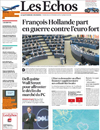
"François Hollande is at war against a strong euro," runs the headline in French financial daily Le Echos following the French president's speech before the European Parliament regarding the future of Europe. The paper reports that in his speech, Hollande called for an exchange rate policy within the eurozone (so that the strong euro does not harm competitiveness), for greater integration and solidarity as well as for the establishment of a common budget for the eurozone.
This vision of Europe is in sharp contrast with that of Great Britain, which calls for a Europe à la carte and of Germany, which is supporting the idea of a two-speed Europe that separates the "good" from the "bad" students. But Hollande's "stated strategy of confrontation with Germany in order to sway the course of Europe," remains nonetheless risky, warns Les Echos, adding –
To be heard, one needs allies and to not turn away those that one hopes to convince. [...] Once this week's Brussels summit on the European budget is over, he will, in the name of growth, reopen the debate over the easing of budgetary constraints. Why not? Berlin does not hold the 10 Commandments. But if the plan is to shake Angela Merkel ahead of her meeting with the electorate [in September], it could be risky.
Receive the best of European journalism straight to your inbox every Thursday
Responding to the French president's comment that national interests overshadow European interests - a statement aimed at the United Kingdom and the less generous countries in the budget talks, such as Germany, German financial daily Frankfurter Allgemeine Zeitung, notes that –
Hollande should not act as if some, bound up in heroic altruism, only consider European interests while others are cold-hearted egotists. There has never been a time at which the various governments in power in Paris have not battled for the interests of French agriculture. Everybody in the EU participates in the fight for redistribution. [...] But no one can seriously imagine that the donor nations will rubber-stamp everything the Commission or the Parliament concoct.
Was this article useful? If so we are delighted!
It is freely available because we believe that the right to free and independent information is essential for democracy. But this right is not guaranteed forever, and independence comes at a cost. We need your support in order to continue publishing independent, multilingual news for all Europeans.
Discover our subscription offers and their exclusive benefits and become a member of our community now!











